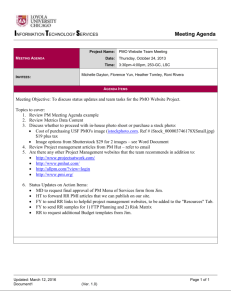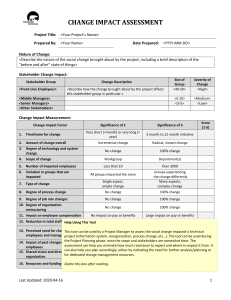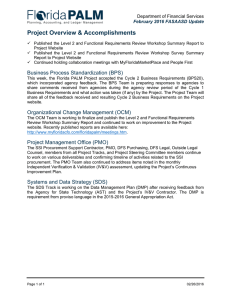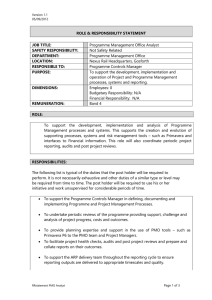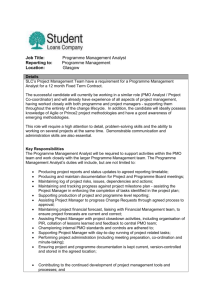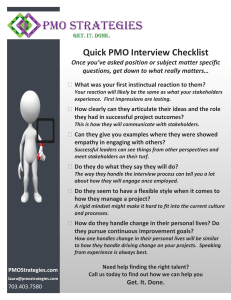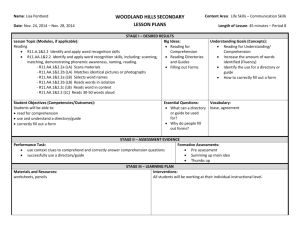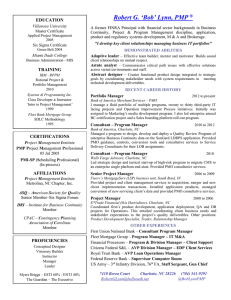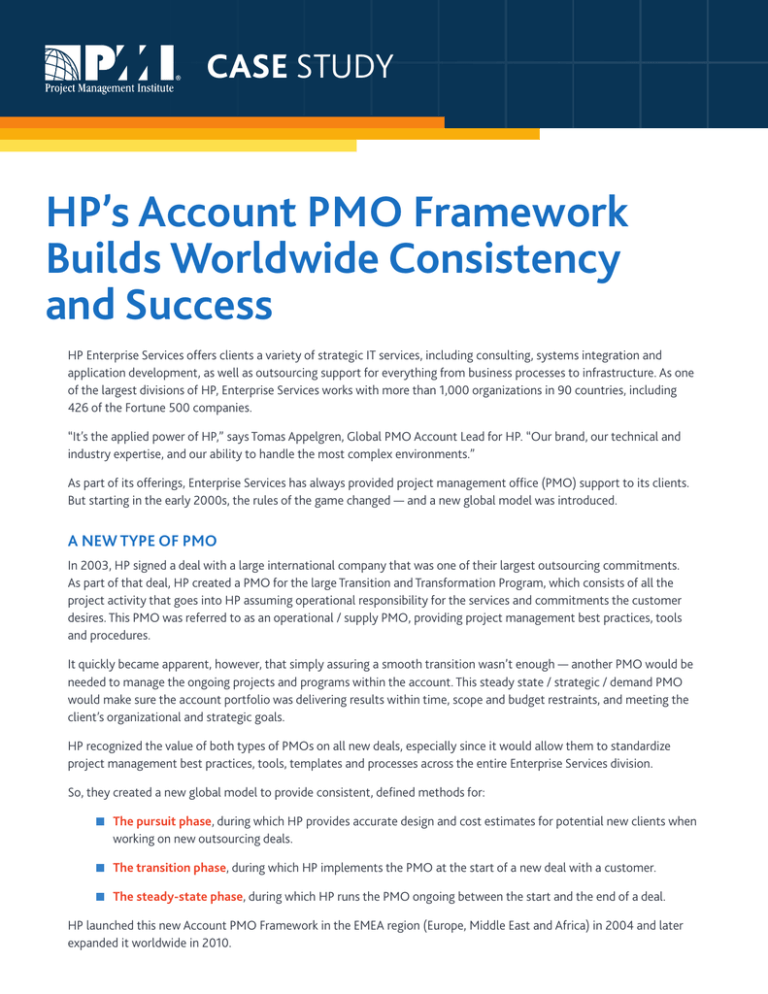
CASE STUDY
HP’s Account PMO Framework
Builds Worldwide Consistency
and Success
HP Enterprise Services offers clients a variety of strategic IT services, including consulting, systems integration and
application development, as well as outsourcing support for everything from business processes to infrastructure. As one
of the largest divisions of HP, Enterprise Services works with more than 1,000 organizations in 90 countries, including
426 of the Fortune 500 companies.
“It’s the applied power of HP,” says Tomas Appelgren, Global PMO Account Lead for HP. “Our brand, our technical and
industry expertise, and our ability to handle the most complex environments.”
As part of its offerings, Enterprise Services has always provided project management office (PMO) support to its clients.
But starting in the early 2000s, the rules of the game changed — and a new global model was introduced.
A NEW TYPE OF PMO
In 2003, HP signed a deal with a large international company that was one of their largest outsourcing commitments.
As part of that deal, HP created a PMO for the large Transition and Transformation Program, which consists of all the
project activity that goes into HP assuming operational responsibility for the services and commitments the customer
desires. This PMO was referred to as an operational / supply PMO, providing project management best practices, tools
and procedures.
It quickly became apparent, however, that simply assuring a smooth transition wasn’t enough — another PMO would be
needed to manage the ongoing projects and programs within the account. This steady state / strategic / demand PMO
would make sure the account portfolio was delivering results within time, scope and budget restraints, and meeting the
client’s organizational and strategic goals.
HP recognized the value of both types of PMOs on all new deals, especially since it would allow them to standardize
project management best practices, tools, templates and processes across the entire Enterprise Services division.
So, they created a new global model to provide consistent, defined methods for:
■■ The pursuit phase, during which HP provides accurate design and cost estimates for potential new clients when
working on new outsourcing deals.
■■ The transition phase, during which HP implements the PMO at the start of a new deal with a customer.
■■ The steady-state phase, during which HP runs the PMO ongoing between the start and the end of a deal.
HP launched this new Account PMO Framework in the EMEA region (Europe, Middle East and Africa) in 2004 and later
expanded it worldwide in 2010.
HP’s Account PMO Framework Builds Worldwide Consistency and Success
THE ACCOUNT PMO FRAMEWORK
“Within Enterprise Services, our main business objective is to take on outsourcing for companies. We set up a new
account that interacts with the customer, and for every new account we set up a PMO,” says Appelgren. “It’s a challenge
to make sure all are set up in the same way globally, and meet the particular objectives for their respective companies.”
To do this, the Account PMO is started at the beginning of the account life cycle and set up to offer four main services to
clients:
■■ Portfolio Management manages the portfolio of the account’s projects and programs, making sure they come
in on time, on budget and within scope.
■■ Account Governance provides a way for both the client and the account team to mutually manage
expectations, relationships and services.
■■ Account Risk Management deals with risks across the entire account, enabling HP and the client to prevent
and/or react to events that threaten the project portfolio.
■■ Program PMO services provides client programs with project management best practices, tools and processes
during the Transition and Transformation stages.
The Account PMO does not function as a separate entity but is organized within the account team for the client it
supports. The exact size and structure varies depending on the complexity and demands of the client account itself. But
no matter how big or small the Account PMO may be, it still maintains regular contact with the customer. In particular,
the Account PMO manager and individual project managers routinely interact with their client counterparts to discuss
statuses and progress, risks and open issues, and sign-offs and approvals.
This comprehensive portfolio of services offers a variety of benefits to clients, including:
■■ Improved predictability and quality of project execution.
■■ A sharper focus on risk management for both individual projects and the account as a whole.
■■ Increased visibility for all projects for internal stakeholders.
■■ Project deliverables tracking and control.
■■ Hands-on management for project issues, decisions and actions.
■■ Resource management to ensure that planned projects have what they need.
But perhaps the biggest benefit is the business value it provides:
■■ The improved quality and predictability of project and program delivery improves customer satisfaction with the
finished product.
■■ The client’s portfolio is managed and executed on time, on budget and within scope — making it easier for these
organizations to achieve their strategic goals.
2
HP’s Account PMO Framework Builds Worldwide Consistency and Success
A SUCCESSFUL CORE COMPETENCY
Today, project management is a core competency for HP, with thousands of active projects throughout the world, and
project, program and portfolio management (PPPM) capabilities spanning global, regional and country levels.
And it’s thanks in large part to the success and impact of the Enterprise Account PMO model:
It creates a consistent global model. Projects (and project reports and measurements) are run the same way in every
part of the world, whether in Stockholm or Los Angeles.
It creates a standardized environment. Project managers don’t have to learn different tools and processes for different
regions. The same set of tools, processes and methodologies is used globally.
It saves money. Maintaining just one framework — as opposed to five or six spread throughout the world — saves HP at
least an estimated $1.5 million a year, or the approximate cost of 10 full-time employees yearly.
It makes HP competitive. The financial and efficiency gains help make HP more competitive in terms of both price and
quality offerings to customers.
And, perhaps most importantly, it provides one face for HP’s customers, who are increasingly satisfied with the
program.
A MORE STRATEGIC FUTURE
Given the success of the Account PMO Framework, HP plans to improve and refine the model.
“Moving forward, we will put even more emphasis on the demand phase,” Appelgren says. Under this approach, the
Portfolio Management service will broaden its role, moving beyond simply executing the portfolio to helping new
account customers from the start.
“Up until now we have, more or less, just accepted all projects as requested by the customers,” Appelgren says. In the
future, they expect to help customers prioritize and define their projects, making the best use of available resources and
HP’s product offerings.
They’ll also focus more on regional execution, making sure the model is implemented consistently around the world.
They’re also starting an internal initiative to identify other areas for improvement.
What won’t change is HP’s dedication to the Account PMO model, and the service it provides to their customers.
“You can see each account as its own little business,” Appelgren says. Put them together, and they add up to the sum of
HP’s business.
© 2013 Project Management Institute, Inc. All rights reserved. “PMI” and the PMI logo are marks of Project Management Institute, Inc.
For a comprehensive list of PMI marks, contact the PMI Legal Department. BRA-201-2013(07/13)
3

